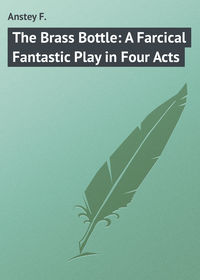 полная версия
полная версияThe Brass Bottle
To his surprise and gratification the Jinnee took this seriously. "I will go forth and make inquiry," he said, "for I desire further enlightenment concerning thy statements. But, remember," he added: "should I still require thee to wed the matchless Bedeea-el-Jemal, and thou shouldst disobey me, thou wilt bring disaster, not on thine own head, but on those thou art most desirous of protecting."
"Yes, so you told me before," said Horace, brusquely. "Good evening." But Fakrash was already gone. In spite of all he had gone through and the unknown difficulties before him, Ventimore was seized with what Uncle Remus calls "a spell of the dry grins" at the thought of the probable replies that the Jinnee would meet with in the course of his inquiries. "I'm afraid he won't be particularly impressed by the politeness of a London crowd," he thought; "but at least they'll convince him that I am not exactly a prominent citizen. Then he'll give up this idiotic match of his – I don't know, though. He's such a pig-headed old fool that he may stick to it all the same. I may find myself encumbered with a Jinneeyeh bride several centuries my senior before I know where I am. No, I forget; there's the jealous Jarjarees to be polished off first. I seem to remember something about a quick-change combat with an Efreet in the "Arabian Nights." I may as well look it up, and see what may be in store for me."
And after dinner he went to his shelves and took down Lane's three-volume edition of "The Arabian Nights," which he set himself to study with a new interest. It was long since he had looked into these wondrous tales, old beyond all human calculation, and fresher, even now, than the most modern of successful romances. After all, he was tempted to think, they might possess quite as much historical value as many works with graver pretentions to accuracy.
He found a full account of the combat with the Efreet in "The Story of the Second Royal Mendicant" in the first volume, and was unpleasantly surprised to discover that the Efreet's name was actually given as "Jarjarees, the son of Rejmoos, the son of Iblees" – evidently the same person to whom Fakrash had referred as his bitterest foe. He was described as "of hideous aspect," and had, it seemed, not only carried off the daughter of the Lord of the Ebony Island on her wedding night, but, on discovering her in the society of the Royal Mendicant, had revenged himself by striking off her hands, her feet, and her head, and transforming his human rival into an ape. "Between this fellow and old Fakrash," he reflected ruefully, at this point, "I seem likely to have a fairly lively time of it!"
He read on till he reached the memorable encounter between the King's daughter and Jarjarees, who presented himself "in a most hideous shape, with hands like winnowing forks, and legs like masts, and eyes like burning torches" – which was calculated to unnerve the stoutest novice. The Efreet began by transforming himself from a lion to a scorpion, upon which the Princess became a serpent; then he changed to an eagle, and she to a vulture; he to a black cat, and she to a cock; he to a fish, and she to a larger fish still.
"If Fakrash can shove me through all that without a fatal hitch somewhere," Ventimore told himself, "I shall be agreeably disappointed in him," But, after reading a few more lines, he cheered up. For the Efreet finished as a flame, and the Princess as a "body of fire." "And when we looked towards him," continued the narrator, "we perceived that he had become a heap of ashes."
"Come," said Horace to himself, "that puts Jarjarees out of action, any way! The odd thing is that Fakrash should never have heard of it."
But, as he saw on reflection, it was not so very odd, after all, as the incident had probably happened after the Jinnee had been consigned to his brass bottle, where intelligence of any kind would be most unlikely to reach him.
He worked steadily through the whole of the second volume and part of the third; but, although he picked up a certain amount of information upon Oriental habits and modes of thought and speech which might come in useful later, it was not until he arrived at the 24th Chapter of the third volume that his interest really revived.
For the 24th Chapter contained "The Story of Seyf-el-Mulook and Bedeea-el-Jemal," and it was only natural that he should be anxious to know all that there was to know concerning the antecedents of one who might be his fiancée before long. He read eagerly.
Bedeea, it appeared, was the lovely daughter of Shahyal, one of the Kings of the Believing Jann; her father – not Fakrash himself, as the Jinnee had incorrectly represented – had offered her in marriage to no less a personage than King Solomon himself, who, however, had preferred the Queen of Sheba. Seyf, the son of the King of Egypt, afterwards fell desperately in love with Bedeea, but she and her grandmother both declared that between mankind and the Jann there could be no agreement.
"And Seyf was a King's son!" commented Horace. "I needn't alarm myself. She wouldn't be likely to have anything to say to me. It's just as I told Fakrash."
His heart grew lighter still as he came to the end, for he learnt that, after many adventures which need not be mentioned here, the devoted Seyf did actually succeed in gaining the proud Bedeea as his wife. "Even Fakrash could not propose to marry me to some one who has a husband already," he thought. "Still, she may be a widow!"
To his relief, however, the conclusion ran thus; "Seyf-el-Mulook lived with Bedeea-el-Jemal a most pleasant and agreeable life … until they were visited by the terminator of delights and the separator of companions."
"If that means anything at all," he reasoned, "it means that Seyf and Bedeea are both deceased. Even Jinneeyeh seem to be mortal. Or perhaps she became so by marrying a mortal; I dare say that Fakrash himself wouldn't have lasted all this time if he hadn't been bottled, like a tinned tomato. But I'm glad I found this out, because Fakrash is evidently unaware of it, and, if he should persist in any more of this nonsense, I think I see my way now to getting the better of him."
So, with renewed hope and in vastly improved spirits, he went to bed and was soon sound asleep.
CHAPTER XV
BLUSHING HONOURSIt was rather late the next morning when Ventimore opened his eyes, to discover the Jinnee standing by the foot of his bed. "Oh, it's you, is it?" he said sleepily. "How did you – a – get on last night?"
"I gained such information as I desired," said Fakrash, guardedly; "and now, for the last time, I am come to ask thee whether thou wilt still persist in refusing to wed the illustrious Bedeea-el-Jemal? And have a care how thou answerest."
"So you haven't given up the idea?" said Horace. "Well, since you make such a point of it, I'll meet you as far as this. If you produce the lady, and she consents to marry me, I won't decline the honour. But there's one condition I really must insist on."
"It is not for thee to make stipulations. Still, yet this once I will hear thee."
"I'm sure you'll see that it's only fair. Supposing, for any reason, you can't persuade the Princess to meet me within a reasonable time – shall we say a week? – "
"Thou shalt be admitted to her presence within twenty-four hours," said the Jinnee.
"That's better still. Then, if I don't see her within twenty-four hours, I am to be at liberty to infer that the negotiations are off, and I may marry anybody else I please, without any opposition from you? Is that understood?"
"It is agreed," said Fakrash, "for I am confident that Bedeea will accept thee joyfully."
"We shall see," said Horace. "But it might be as well if you went and prepared her a little. I suppose you know where to find her – and you've only twenty-four hours, you know."
"More than is needed," answered the Jinnee, with such childlike confidence, that Horace felt almost ashamed of so easy a victory. "But the sun is already high. Arise, my son, put on these robes" – and with this he flung on the bed the magnificent raiment which Ventimore had last worn on the night of his disastrous entertainment – "and when thou hast broken thy fast, prepare to accompany me."
"Before I agree to that," said Horace, sitting up in bed, "I should like to know where you're taking me to."
"Obey me without demur," said Fakrash, "or thou knowest the consequences."
It seemed to Horace that it was as well to humour him, and he got up accordingly, washed and shaved, and, putting on his dazzling robe of cloth-of-gold thickly sewn with gems, he joined Fakrash – who, by the way, was similarly, if less gorgeously, arrayed – in the sitting-room, in a state of some mystification.
"Eat quickly," commanded the Jinnee, "for the time is short." And Horace, after hastily disposing of a cold poached egg and a cup of coffee, happened to go to the windows.
"Good Heavens!" he cried. "What does all this mean?"
He might well ask. On the opposite side of the road, by the railings of the square, a large crowd had collected, all staring at the house in eager expectation. As they caught sight of him they raised a cheer, which caused him to retreat in confusion, but not before he had seen a great golden chariot with six magnificent coal-black horses, and a suite of swarthy attendants in barbaric liveries, standing by the pavement below. "Whose carriage is that?" he asked.
"It belongs to thee," said the Jinnee; "descend then, and make thy progress in it through the City."
"I will not," said Horace. "Even to oblige you I simply can't drive along the streets in a thing like the band-chariot of a travelling circus."
"It is necessary," declared Fakrash. "Must I again recall to thee the penalty of disobedience?"
"Oh, very well," said Horace, irritably. "If you insist on my making a fool of myself, I suppose I must. But where am I to drive, and why?"
"That," replied Fakrash, "thou shalt discover at the fitting moment." And so, amidst the shouts of the spectators, Ventimore climbed up into the strange-looking vehicle, while the Jinnee took his seat by his side. Horace had a parting glimpse of Mr. and Mrs. Rapkin's respective noses flattened against the basement window, and then two dusky slaves mounted to a seat at the back of the chariot, and the horses started off at a stately trot in the direction of Rochester Row.
"I think you might tell me what all this means," he said. "You've no conception what an ass I feel, stuck up here like this!"
"Dismiss bashfulness from thee, since all this is designed to render thee more acceptable in the eyes of the Princess Bedeea," said the Jinnee.
Horace said no more, though he could not but think that this parade would be thrown away.
But as they turned into Victoria Street and seemed to be heading straight for the Abbey, a horrible thought occurred to him. After all, his only authority for the marriage and decease of Bedeea was the "Arabian Nights," which was not unimpeachable evidence. What if she were alive and waiting for the arrival of the bridegroom? No one but Fakrash would have conceived such an idea as marrying him to a Jinneeyeh in Westminster Abbey; but he was capable of any extravagance, and there were apparently no limits to his power.
"Mr. Fakrash," he said hoarsely, "surely this isn't my – my wedding day? You're not going to have the ceremony there?"
"Nay," said the Jinnee, "be not impatient. For this edifice would be totally unfitted for the celebration of such nuptials as thine."
As he spoke, the chariot left the Abbey on the right and turned down the Embankment. The relief was so intense that Horace's spirits rose irrepressibly. It was absurd to suppose that even Fakrash could have arranged the ceremony in so short a time. He was merely being taken for a drive, and fortunately his best friends could not recognise him in his Oriental disguise. And it was a glorious morning, with a touch of frost in the air and a sky of streaky turquoise and pale golden clouds; the broad river glittered in the sunshine; the pavements were lined with admiring crowds, and the carriage rolled on amidst frantic enthusiasm, like some triumphal car.
"How they're cheering us!" said Horace. "Why, they couldn't make more row for the Lord Mayor himself."
"What is this Lord Mayor of whom thou speakest?" inquired Fakrash.
"The Lord Mayor?" said Horace. "Oh, he's unique. There's nobody in the world quite like him. He administers the law, and if there's any distress in any part of the earth he relieves it. He entertains monarchs and Princes and all kinds of potentates at his banquets, and altogether he's a tremendous swell."
"Hath he dominion over the earth and the air and all that is therein?"
"Within his own precincts, I believe he has," said Horace, rather lazily, "but I really don't know precisely how wide his powers are." He was vainly trying to recollect whether such matters as sky-signs, telephones, and telegraphs in the City were within the Lord Mayor's jurisdiction or the County Council's.
Fakrash remained silent just as they were driving underneath Charing Cross Railway Bridge, when he started perceptibly at the thunder of the trains overhead and the piercing whistles of the engines. "Tell me," he said, clutching Horace by the arm, "what meaneth this?"
"You don't mean to say," said Horace, "that you have been about London all these days, and never noticed things like these before?"
"Till now," said the Jinnee, "I have had no leisure to observe them and discover their nature."
"Well," said Horace, anxious to let the Jinnee see that he had not the monopoly of miracles, "since your days we have discovered how to tame or chain the great forces of Nature and compel them to do our will. We control the Spirits of Earth, Air, Fire, and Water, and make them give us light and heat, carry our messages, fight our quarrels for us, transport us wherever we wish to go, with a certainty and precision that throw even your performances, my dear sir, entirely into the shade."
Considering what a very large majority of civilised persons would be as powerless to construct the most elementary machine as to create the humblest kind of horse, it is not a little odd how complacently we credit ourselves with all the latest achievements of our generation. Most of us accept the amazement of the simple-minded barbarian on his first introduction to modern inventions as a gratifying personal tribute: we feel a certain superiority, even if we magnanimously refrain from boastfulness. And yet our own particular share in these discoveries is limited to making use of them under expert guidance, which any barbarian, after overcoming his first terror, is quite as competent to do as we are.
It is a harmless vanity enough, and especially pardonable in Ventimore's case, when it was so desirable to correct any tendency to "uppishness" on the part of the Jinnee.
"And doth the Lord Mayor dispose of these forces at his will?" inquired Fakrash, on whom Ventimore's explanation had evidently produced some impression.
"Certainly," said Horace; "whenever he has occasion."
The Jinnee seemed engrossed in his own thoughts, for he said no more just then.
They were now nearing St. Paul's Cathedral, and Horace's first suspicion returned with double force.
"Mr. Fakrash, answer me," he said. "Is this my wedding day or not? If it is, it's time I was told!"
"Not yet," said the Jinnee, enigmatically, and indeed it proved to be another false alarm, for they turned down Cannon Street and towards the Mansion House.
"Perhaps you can tell me why we're going through Victoria Street, and what all this crowd has come out for?" asked Ventimore. For the throng was denser than ever; the people surged and swayed in serried ranks behind the City police, and gazed with a wonder and awe that for once seemed to have entirely silenced the Cockney instinct of persiflage.
"For what else but to do thee honour?" answered Fakrash.
"What bosh!" said Horace. "They mistake me for the Shah or somebody – and no wonder, in this get-up."
"Not so," said the Jinnee. "Thy names are familiar to them."
Horace glanced up at the hastily improvised decorations; on one large strip of bunting which spanned the street he read: "Welcome to the City's most distinguished guest!" "They can't mean me," he thought; and then another legend caught his eye: "Well done, Ventimore!" And an enthusiastic householder next door had burst into poetry and displayed the couplet —
"Would we had twenty moreLike Horace Ventimore!""They do mean me!" he exclaimed. "Now, Mr. Fakrash, will you kindly explain what tomfoolery you've been up to now? I know you're at the bottom of this business."
It struck him that the Jinnee was slightly embarrassed. "Didst thou not say," he replied, "that he who should receive the freedom of the City from his fellow-men would be worthy of Bedeea-el-Jemal?"
"I may have said something of the sort. But, good heavens! you don't mean that you have contrived that I should receive the freedom of the City?"
"It was the easiest affair possible," said the Jinnee, but he did not attempt to meet Horace's eye.
"Was it, though?" said Horace, in a white rage. "I don't want to be inquisitive, but I should like to know what I've done to deserve it?"
"Why trouble thyself with the reason? Let it suffice thee that such honour is bestowed upon thee."
By this time the chariot had crossed Cheapside and was entering King Street.
"This really won't do!" urged Horace. "It's not fair to me. Either I've done something, or you must have made the Corporation believe I've done something, to be received like this. And, as we shall be in the Guildhall in a very few seconds, you may as well tell me what it is!"
"Regarding that matter," replied the Jinnee, in some confusion, "I am truly as ignorant as thyself."
As he spoke they drove through some temporary wooden gates into the courtyard, where the Honourable Artillery Company presented arms to them, and the carriage drew up before a large marquee decorated with shields and clustered banners.
"Well, Mr. Fakrash," said Horace, with suppressed fury, as he alighted, "you have surpassed yourself this time. You've got me into a nice scrape, and you'll have to pull me through it as well as you can."
"Have no uneasiness," said the Jinnee, as he accompanied his protégé into the marquee, which was brilliant with pretty women in smart frocks, officers in scarlet tunics and plumed hats, and servants in State liveries.
Their entrance was greeted by a politely-subdued buzz of applause and admiration, and an official, who introduced himself as the Prime Warden of the Candlestick-makers' Company, advanced to meet them. "The Lord Mayor will receive you in the library," he said. "If you will have the kindness to follow me – "
Horace followed him mechanically. "I'm in for it now," he thought, "whatever it is. If I can only trust Fakrash to back me up – but I'm hanged if I don't believe he's more nervous than I am!"
As they came into the noble Library of the Guildhall a fine string band struck up, and Horace, with the Jinnee in his rear, made his way through a lane of distinguished spectators towards a dais, on the steps of which, in his gold-trimmed robes and black-feather hat, stood the Lord Mayor, with his sword and mace-bearers on either hand, and behind him a row of beaming sheriffs.
A truly stately and imposing figure did the Chief Magistrate for that particular year present: tall, dignified, with a lofty forehead whose polished temples reflected the light, an aquiline nose, and piercing black eyes under heavy white eyebrows, a frosty pink in his wrinkled cheeks, and a flowing silver beard with a touch of gold still lingering under the lower lip: he seemed, as he stood there, a worthy representative of the greatest and richest city in the world.
Horace approached the steps with an unpleasant sensation of weakness at the knees, and no sort of idea what he was expected to do or say when he arrived.
And, in his perplexity, he turned for support and guidance to his self-constituted mentor – only to discover that the Jinnee, whose short-sightedness and ignorance had planted him in this present false position, had mysteriously and perfidiously disappeared, and left him to grapple with the situation single-handed.
CHAPTER XVI
A KILLING FROSTFortunately for Ventimore, the momentary dismay he had felt on finding himself deserted by his unfathomable Jinnee at the very outset of the ceremony passed unnoticed, as the Prime Warden of the Candlestick-makers' Company immediately came to his rescue by briefly introducing him to the Lord Mayor, who, with dignified courtesy, had descended to the lowest step of the dais to receive him.
"Mr. Ventimore," said the Chief Magistrate, cordially, as he pressed Horace's hand, "you must allow me to say that I consider this one of the greatest privileges – if not the greatest privilege – that have fallen to my lot during a term of office in which I have had the honour of welcoming more than the usual number of illustrious visitors."
"My Lord Mayor," said Horace, with absolute sincerity, "you really overwhelm me. I – I only wish I could feel that I had done anything to deserve this – this magnificent compliment!"
"Ah!" replied the Lord Mayor, in a paternally rallying tone. "Modest, my dear sir, I perceive. Like all truly great men! A most admirable trait! Permit me to present you to the Sheriffs."
The Sheriffs appeared highly delighted. Horace shook hands with both of them; indeed, in the flurry of the moment he very nearly offered to do so with the Sword and Mace bearers as well, but their hands were, as it happened, otherwise engaged.
"The actual presentation," said the Lord Mayor, "takes place in the Great Hall, as you are doubtless aware."
"I – I have been given to understand so," said Horace, with a sinking heart – for he had begun to hope that the worst was over.
"But before we adjourn," said his host, "you will let me tempt you to partake of some slight refreshment – just a snack?"
Horace was not hungry, but it occurred to him that he might get through the ceremony with more credit after a glass of champagne; so he accepted the invitation, and was conducted to an extemporised buffet at one end of the Library, where he fortified himself for the impending ordeal with a caviare sandwich and a bumper of the driest champagne in the Corporation cellars.
"They talk of abolishing us," said the Lord Mayor, as he took an anchovy on toast; "but I maintain, Mr. Ventimore – I maintain that we, with our ancient customs, our time-honoured traditions, form a link with the past, which a wise statesman will preserve, if I may employ a somewhat vulgar term, untinkered with."
Horace agreed, remembering a link with a far more ancient past with which he devoutly wished he had refrained from tinkering.
"Talking of ancient customs," the Lord Mayor continued, with an odd blend of pride and apology, "you will shortly have an illustration of our antiquated procedure, which may impress you as quaint."
Horace, feeling absolutely idiotic, murmured that he felt sure it would do that.
"Before presenting you for the freedom, the Prime Warden and five officials of the Candlestick-makers' Company will give their testimony as compurgators in your favour, making oath that you are 'a man of good name and fame,' and that (you will be amused at this, Mr. Ventimore) – that you 'do desire the freedom of this city, whereby to defraud the Queen or the City.' Ha, ha! Curious way of putting it, is it not?"
"Very," said Horace, guiltily, and not a little concerned on the official's account.
"A mere form!" said the Lord Mayor; "but I for one, Mr. Ventimore – I for one should be sorry to see the picturesque old practices die out. To my mind," he added, as he finished a pâté de foie gras sandwich, "the modern impatience to sweep away all the ancient landmarks (whether they be superannuated or not) is one of the most disquieting symptoms of the age. You won't have any more champagne? Then I think we had better be making our way to the Great Hall for the Event of the Day."
"I'm afraid," said Horace, with a sudden consciousness of his incongruously Oriental attire – "I'm afraid this is not quite the sort of dress for such a ceremony. If I had known – "









